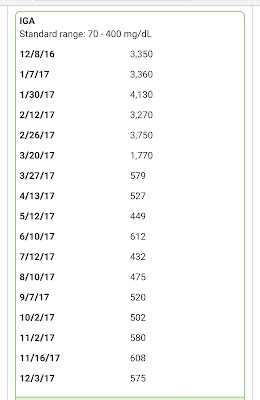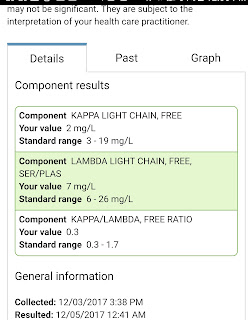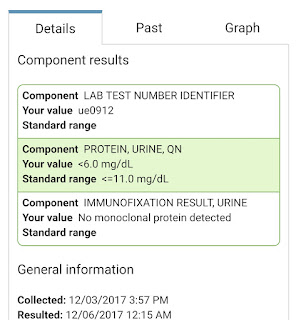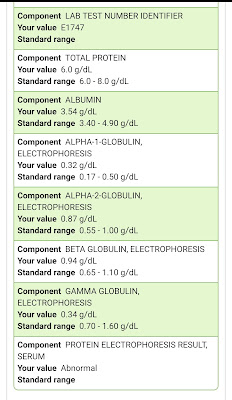12.7.17
Hello December, month of monumental anniversaries...
But for now, I'll keep it short and sweet and share my recent lab results
After a lousy, crazy November, with being sick more than well, I am happy to greet December 2017. Strangely, after battling the vicious viral URI that attacked me, my recent December 3 labs gifted me with relatively good results. So strange, after being so sick, missing my monthly November Darzalex infusion, taking a few days off of Pomalyst, and not taking Dex every week, my labs came back with good news. I will note though, that prior to doing the Dec 3 labs, I had been back on Pomalyst and Dex for a week. I'm super proud of my minimal compromised immune system for rallying, and pummeling the viral bug and myeloma at the same time!
IgA down from last month!
Yep, IgA down a bit!
Not bad, right :))
Whoohoo, no Monoclonal Protein detected!
Yep, "Abnormal", but no M Protein spike
So what have I learned from all of this...
1- I have to absorb the full impact of being a cancer patient, 24/7, every day of the year
2- I should not minimize any of my symptoms, and "accept" the seriousness of my situation
3- I need to take my treatment regimen seriously, and not "cheat" on taking Dex steroids weekly
4- I need to fully accept I am not "normal" anymore, and I never will be again
5- As good as I am with saying "no" to events and people, I need to adhere to my "rules" to stay healthy
6- I need to stop being so "strong" and accept I am battling incurable cancer, forever
7- I need to fully accept that my life prior to myeloma is gone, and accept I have an "aggressive" form of myeloma, that needs to be constantly treated aggressively
Even as I write all that, it's still impossible for me to fully connect with my status. I tell people my story, hear their amazement and concern, but feel as if I am describing someone else's life story. Even as I near my 8 year myeloma diagnosis anniversary, I still feel so detached from all of this. I write my story, tell my story, describe my treatments and side effects, yet it all still feels so "out of body". Intellectually, I know my situation. Psychologically, I just don't "feel" it. As lousy as I feel so much of the time, it's the few "good days" that affirm my disbelief of my cancer status. So weird.
Yep, I'm pretty worn out battling, fighting, ingesting, injecting, trying to heal, trying to feel well, trying to "get back to normal", an elusive, non existent normal. I'm so tried of challenges. I just want simplicity in my life. Less is More. But myeloma insists on more and more and more...
So just as I'm beginning to feel better the other day, my lower GI surprised me again with after dinner diarrhea. Ok body, fine, clean out the plumbing, but lets not make it an all night event. Maybe it was my after steroids crash? Who knows, I can't keep up with all my symptoms and side effects. But after a while, it gets ridiculous, so I take a swig of Imodium, which works like a charm for me. When I know the coast is clear, I shower and look forward to bed and sleep. But no, no peaceful end of the night for me, as when I went to blow dry my hair, my hairdryer sparked, sputtered, sparked more, and flamed, almost catching my hair on fire. Really?! C'mon life, can I have a break please!
And then the next day, gale force winds hit CA, and our poor state is burning up. I am just overwhelmed with all the devastation affecting people, animals, and the landscape. In comparison, my issues are small. I have a home, insurance, and all my loved ones (human and animal) are safe. So I shut my trap, count my blessings and good fortune, and focus on how lucky I am, as my heart breaks for those who's lives are suddenly, inexplicably destroyed.
8 years ago December, I was very sick, and had no clue. No clue how close I was to not being here... December 14, 2009 was my first "Hematology/Oncology" appointment... 8 years later, I am still here myeloma!
Live happy,
live well, and make a difference somewhere, somehow, with someone or something
as often as you can!








Hey friend, thanks for the update. I can only imagine how difficult and how life as you know it now gets old. Even in the midst of your honest sharing, there is positivity and light. I'm sorry you have to suffer through all of this. I glad your recent lab numbers looked better. Love you lots. Gay
ReplyDeleteAwww Gay! Thank you so much for checking in, and continuing to follow my "drama". Whew! What a crazy last month+ I have had! I will message you for your updates, and to plan a visit in Jan 2018. Much love and hugs xoxo
Delete